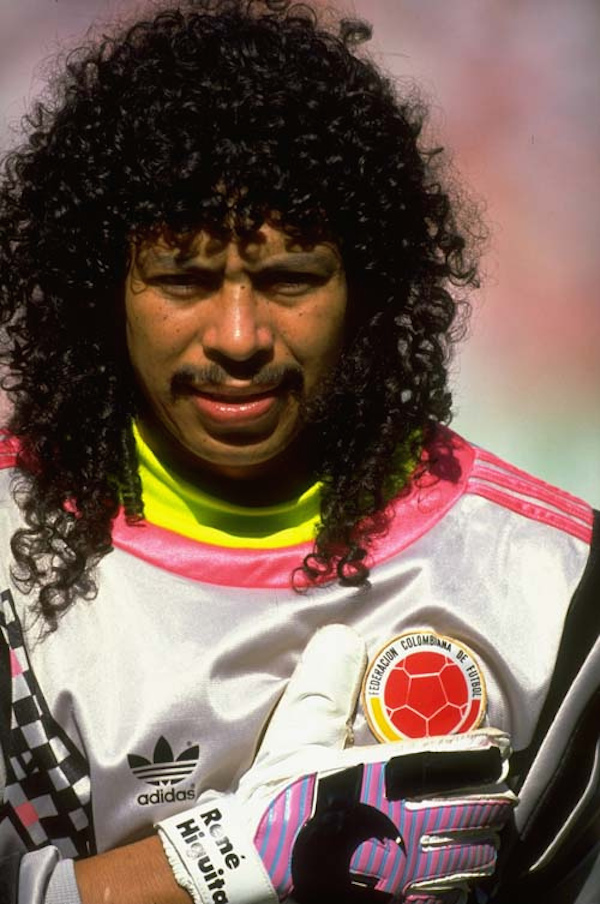Goalie or goaltender is a distinctive position in every sport that has it. Ice hockey goalies stay on the ice for the entire game while their teammates substitute in and out almost constantly. Lacrosse goalies have enormous sticks. Water polo goalies are the only players who can legally touch the bottom of the pool. None of these distinctions come close to a goalie’s distinctiveness in soccer. Goaltenders in soccer are the only players who can use their hands. Although this privilege is limited to when a goalie is within her own penalty box, it’s sets them apart so much that they’re required to wear distinctively colored shirts to make it easier for refs to tell them apart.
You might think the enormous advantage of being able to use one’s hands would make goalie the easiest position to play. Not true! The extra privileges of the goalie in most sports are a recognition of how difficult their job is and nowhere is this more true than in soccer. The first thing a soccer goalie has to come to terms with is the size of her task… literally! A soccer goal is 24 feet wide and eight feet tall. That’s an enormous area for a single person to cover. It’s too much, even for the most athletic goalie to be able to leap from the center of the goal, all the way to the side to stop a shot. So, the smart soccer goalie uses angles and anticipation. If an attack is coming from the right, they move towards it; out and to the right. From the shooter’s perspective, this has the effect of effectively making the goalie a larger obstacle which is harder to shoot around. If this doesn’t make intuitive sense, think about having to hit a barn with a tomato but needing to avoid the barn door. It’s pretty easy but it would be a lot harder if someone detached the door and stood it up right in front of you. You’d have to throw the tomato over the door or around the door. Same size door, different size challenge.
The issue with playing the angles is that if a goalie guesses wrong or if an attacker is able to pass to a teammate on the other side of the field, the goalie will most likely be too far out of position to recover in time to make a save. Some goalies play deeper in their net and trust their athleticism and reaction time. Goalies need to have incredibly good judgement and fast, decisive, decision-making skills. One wrong move could be one too many. The margin of error for goalies in soccer, because it is such a low scoring sport, is tiny and the consequences for error are enormous. Take poor Robert Green, for instance. In 2010 he was one of the best 40 people in the entire world at his profession yet all he will be remembered for (literally, it’s going to be the first line of his obituary one day) will be this momentary lapse against the United States in the World Cup.
Beyond simply getting in the way of the ball when it’s shot at the goal, goaltenders have a number of other responsibilities. If you watch soccer on television, you’ll often see shots of goalies screaming at their teammates. They’re not cursing them out or at least, they’re not just cursing them out. Goalies are responsible for organizing their teammates on defense. Any single defender may have to turn his back to one side of the field or the other, or may be too far forward and miss what’s going on behind them. From their position closest to the goal, only goaltenders can see everything that’s going on. It’s their job to communicate.
The challenges and pressure that goalies face seems to attract or create two types of people: those who compensate through obsessive behavior and those who compensate through aberrant behavior. Almost all goalies are one of the two types, some are both. This is true across all sports. Hockeygrrl lists some of the more well-known obsessive behavior in her post about hockey goalies, including Patrick Roy’s refusal to let anything, even ice shavings into his net, Henrik Lundqvist’s ritual of tapping the wall the same number of periods he’s played so far in the game, and my new favorite, Jocelyn Thibault’s tradition of pouring “water over his head precisely six-and-a-half minutes before a game began.” For the more far-out their behavior on the other side of the spectrum, see Colombian soccer goalie Rene Higuita, who was literally nicknamed “the lunatic” and hockey goalie Ilya Bryzgalov who once responded to a question about the offensive threats on an opposing team by saying that he was “only afraid of [a] bear.”

